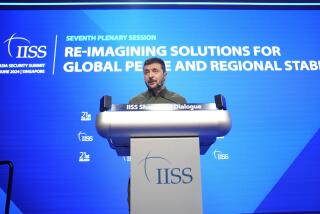Improved Sino-Soviet Ties May Yield Top-Level Visits
- Share via
WASHINGTON — Relations between the Soviet Union and China have improved to the point where the world’s two largest Communist nations are ready to begin their first high-level exchanges in two decades, U.S. officials say.
As Soviet leader Mikhail S. Gorbachev prepares for his summit meeting with President Reagan, U.S. officials say Gorbachev has helped his bargaining position by steadily upgrading his country’s ties to Beijing.
“We’re seeing a whole series of agreements (between China and the Soviet Union) we haven’t seen since the 1950s,” one U.S. expert said. “Talks on (settling disputes over) their border are progressing. For the most part, Sino-Soviet relations are normalized.”
This U.S. official and two others all said in separate interviews that they believe China and the Soviet Union will soon announce an exchange of official visits by their foreign ministers. Soviet Foreign Minister Eduard A. Shevardnadze would be invited to Beijing, and Chinese Foreign Minister Qian Qichen would travel to Moscow.
“We’re looking at late summer or fall,” a State Department official predicted, referring to the start of the new contacts. He said China, which has long complained about the Soviet presence in Afghanistan, wants to give Gorbachev “a reward” for his decision this year to pull Soviet troops out of that country.
China has been anxious to play down its improved ties to Moscow because it does not want to alarm the West, from which it hopes to continue obtaining valued technology, another U.S. expert said. The Soviet objective is not a return to the Sino-Soviet alliance of the 1950s, but rather Chinese neutrality, he said.
“The Soviets would be satisfied with an independently acting China,” this official said. China has repeatedly proclaimed that it has an independent foreign policy, but it has also carried on a series of military exchanges with the United States.
The last time any top leader of China or the Soviet Union visited the other country was in 1969, when Soviet Premier Alexei N. Kosygin stopped in Beijing to meet with Premier Chou En-lai. At that time, the two countries were on the verge of all-out war after a series of skirmishes along their borders. Since then, foreign ministers of the two countries have met only during the U.N. General Assembly meeting in New York City.
A decade ago, China’s fear of a Soviet military invasion remained so great that Chinese leader Deng Xiaoping repeatedly urged the Jimmy Carter Administration and Western European countries to join with China in strategic cooperation against the Soviet Union.
Reject Anti-Soviet Bloc
Chinese leaders now firmly reject any suggestion of an anti-Soviet alignment. Zhao Ziyang, the Communist Party general secretary, told one group of American visitors last week that relations between China and the United States “should not be directed against a third country, or they will be unstable and transient.”
The initiative for improving Sino-Soviet relations has come almost entirely from Gorbachev, who listed better ties with China as one of his highest priorities in his maiden speech as Soviet leader in March, 1985.
U.S. experts say China, in effect, now sets the timetable for the gradual upgrading of relations. “Beijing controls it,” one analyst said. “They know Gorbachev needs it.”
The exchange of foreign ministers’ visits is seen as the first “reward” China holds out for the Soviets in a carefully calibrated series of steps toward full restoration of relations.
The next move might be an exchange of visits by the premiers of the two countries, and then a summit meeting between the two leaders, Deng and Gorbachev. The final step in restoring ties would be to establish official, party-to-party relations between the Soviet and Chinese Communist parties.
More Concessions Seen
U.S. officials say they believe China will insist upon more foreign policy concessions from Gorbachev before taking these further steps.
From the Chinese viewpoint, the most important of these concessions concerns Cambodia. China has demanded that the Soviet Union persuade Vietnam, which the Soviets support with massive military aid, to withdraw its troops from Cambodia. Vietnam invaded Cambodia in 1978 to oust the Khmer Rouge regime, which was backed by China.
“There’s still more to come, but they (China and the Soviet Union) have come a long way already,” one senior U.S. analyst said. The two countries have been re-establishing cultural and other links even more quickly than their official relations, he said.
Last week, for example, China and the Soviet Union signed a new cultural agreement, under which the Bolshoi Ballet will perform in Beijing, and representatives of the Hermitage Museum in Leningrad and Beijing’s National Palace Museum will begin exchanges with one another. Such cooperation would have been unthinkable as recently as three years ago.
Watching Economic Reforms
China and the Soviet Union have also expressed increasing interest in the progress of each other’s economic reform programs. Chinese Vice Premier Tian Jiyun said earlier this year that the two nations could learn from one another in trying to overhaul their centrally planned economies.
The U.S. officials all made their forecasts about new high-level contacts between the two countries in response to a reporter’s inquiries. One of them, a senior State Department official, asserted that the United States has not been informed of any plans for a meeting but said the improving ties between the Soviet Union and China make it logical that these exchanges will be announced soon.
Last November, on the eve of his last summit meeting with President Reagan in Washington, Gorbachev announced that he was ready to meet with Deng in either Beijing or Moscow to try to resolve all Sino-Soviet differences. Deng quickly turned down the overture.
In 1986, China restored full ties with several Eastern European regimes, including close Soviet allies like Poland, East Germany and Czechoslovakia.
More to Read
Sign up for Essential California
The most important California stories and recommendations in your inbox every morning.
You may occasionally receive promotional content from the Los Angeles Times.













